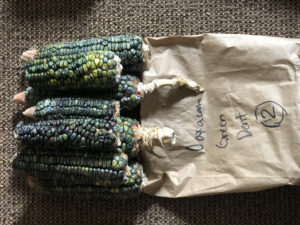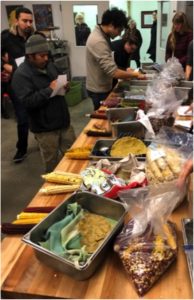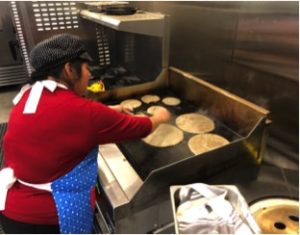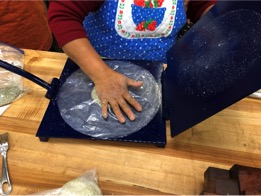
OSA is thrilled to partner with Washington farmers and Viva Farms, a non-profit farm business incubator for aspiring and limited resource farmers in Skagit Valley, in searching for corn varieties that will mature in the short growing season here in Western Washington and that can be made into high-quality tortillas. On December 3rd, 2019, OSA and Viva Farms co-hosted a tortilla tasting at the Bread Lab in Mount Vernon, WA, to identify the most delicious varieties.
Learning from Local Farmers
Each year OSA convenes farmers in Western Washington to ask what crops they want to prioritize for the next year’s variety trials to evaluate on their farms and at OSA’s research farm. Last winter Katherine Myrvold, sales and farmer training coordinator at Viva Farms, approached OSA to share that several of the Latinx farmers at Viva Farms were looking for corn to produce high-quality tortillas similar to the ones they grew up with in their home state of Oaxaca, Mexico.

In a meeting with Viva farmer Nelida Martinez of Pure Nelida Farm, and Salvador and Misael Morales of Northwest Green Farm, OSA staff and Viva farmers decided to run trials to see if there were any dry corn varieties that are already well adapted to the region that could be made into tortillas.
Farmers from Matsuda Farm, Twin Vista Ranch, Broken Ground Farm, Coriander Creek Farm, Eldur Heron Farm, and the Viva Farms Practicum in Sustainable Agriculture got excited by the prospect of regionally grown corn and signed up to collaborate. Eleven varieties were sourced based on recommendations from regional farmers and seed companies and they were trialed at the six sites around Western Washington. Field evaluations focused on production qualities, including days to maturity, yield, and ear quality, but after the harvest the real test remained: How did they taste?
The research team, lacking knowledge in tortilla making, was fortunate to lean on the expertise of participating farmer Nelida Martinez, who grew up on tortillas and has a reputation for serving up fresh, homemade tortillas at a Saturday farmers market in Skagit Valley. OSA also enlisted the assistance of Reed Aubin, who is the Port Townsend High School’s Spanish teacher, a steward of Bear Island Chippewa Flint corn, and lover of corn. Reed has been growing Bear Island Flint for years and making it into tortillas with his Spanish class.
From Seed to Tortilla
To test the methods, we organized a tortilla tasting with Port Townsend High School Spanish students, which gave OSA staff the opportunity to better understand the process of making Nixtamal and what it takes to evaluate corn for its ability to make tortillas and provide students an engaged, applied opportunity to expand their appreciation of Mexican culture and cuisine. With student participation the Nixtamalization entailed boiling 3 cups of each variety for 20 minutes with 4 tbsp cal (Calcium Hydroxide/pickling lime) and then soaking it overnight. The corn was then rinsed and rubbed to remove the pericarp (cascara). Tuscarora is a variety that was overcooked and became caustic, indicating its soft pericarp requires less processing, so it wasn’t evaluated. Students then ground each variety, pressed them into tortillas, and evaluated them for flavor and pliability.

With the lessons learned at the high school, we then visited Viva Farms to hold a tasting with the farm community at the Bread Lab. This time the nixtamalization process was as follows: 3 cups of each variety cooked with 3 tbsp cal for ten minutes then let it soak overnight before rinsing. Using this method, Painted Mountain flour corn was the only variety that was cooked enough to make into tortillas without further cooking. Abenaki and Cascade Ruby Gold were not cooked enough to remove a thicker cascara and would have benefited from longer cooking in cal. Each of the other varieties were further cooked on the griddle until ready for pressing. Lacking a mechanical masa grinder, we ground the Nixtamal once through a mechanical meat grinder, then a second time through a hand grinding masa flour mill (Corona brand). This made a dough that was quite finely ground, but according to Nelida, not as fine as would result from the use of a traditional stone hand grinder (metate). The tortillas were a little rustic, but still quite good.
So, how did they taste?
Jerry Peterson Blue is the variety that won the taste test at the Port Townsend High School and was most rated as a favorite among Viva staff and farmers, with Painted Mountain and Nothstine also ranking highly for flavor. We found Tuscarora to be touchy to evaluate, because it became caustic with the Nixtamalization process used with the Port Townsend High School Spanish class, and undercooked when less cal and cooking time was used. Tuscarora White came to OSA from Tessa Gowan of Seed Dreams, originally from the Tuscaroras who fled North to join the Haudenosaunee Confederacy, adapting the corn to northern regions along the way. It is traditionally cooked with wood ash rather than cal and is often made into cakes or hominy and eaten in soup.

As Nelida was preparing the tortillas, Katherine from Viva Farms was able to take notes on how the masa was to work with, translating Nelida’s comments along the way. Nelida’s favorite was Painted Mountain because it was the only variety that was Nixtamalized well and it also turned out to be well suited for tortillas. Everyone loved the tortilla color of the Hopi Purple and the Jerry Peterson Blue, while the multi-colored varieties tended to turn a muddled brown. OSA’s Micaela Colley served up a delicious pot roast to help cleanse our palates between varieties, and the room went quiet as the tasting began.
We are grateful to Nelida for inspiring the project, sharing her years of valuable knowledge, and her dedication to making the tortillas. During preparations it became clear that if she didn’t make all the tortillas for the taste test then there would be a bias in the evaluation. We are also thankful for Katherine’s brilliant and focused translation, to the Bread Lab for providing us with the kitchen and equipment, and to all of the farmers who trialed the corn: Alexa Helbling, Caitlin Ames, Jenn Williams, Nate Minor, Amy Boettcher, Mike McIves, and Marty and Tara Simpson. Lastly, we’re so grateful to all of the Viva Farms staff who put in the legwork to secure the space and test grinding equipment ahead of time and to the Port Townsend High School Spanish class, Reed Aubin for advice and equipment, and to all of the seed companies who gave us advice on which varieties to trial. These companies include: Adaptive Seeds, Bisek Garden Seeds, Johnny’s Selected Seeds, Nash’s Organic Produce, Resilient Seeds, and Siskiyou Seeds. We are so excited to see where this project will go next! In the meantime, be on the lookout for our full trial report of this data.
